Aktuelles
30.09.2020
ECML Webinar "How to ensure that languages flourish in your school" (12 October 2020): register until 9 October!

Would you describe your school as language-sensitive? Were teachers able to address the different linguistic needs of learners during lockdown? How well is your school adapting to hybrid ways of working? Are you looking for inspiring ideas for launching whole-school language projects?
If you are a headteacher, inspector or in a role that supports teacher development in relation to language education, this webinar is for you. By showing you a range of easy-to-use resources developed through the ECML project EOL – learning environments where foreign languages flourish – and adapted to hybrid learning, it will help you see how much your school can benefit from taking a holistic approach to language education which supports all learners reach their potential. It also offers an excellent opportunity to promote collective reflection around the challenges that schools are facing as the pandemic continues.
The webinar will take place at the following times:
- in English: Monday, 12 October: 14:00-15:30 CET
- in French: Monday, 12 October: 16:00-17:30 CET
If you wish to participate, please register here by 9 October indicating which session (English or French) you would like to attend. Registered participants will receive an e-mail notification by 9 October including the link to join the webinar on 12 October.
For any questions regarding registration please contact: catherine.seewald@ecml.at indicating in the subject line of your message “How to ensure that languages flourish in your school” webinar.
05.06.2020
Promoting quality language education through learning environments where modern languages flourish

The European Centre for Modern Languages (ECML) of the Council of Europe is pleased to announce the launch of a new resource website of particular relevance to language teachers, subject teachers, teacher educators and headteachers at a time when schools are cautiously reopening across Europe.
“EOL – Learning environments where modern languages flourish”
This website which is available in English, French and German, provides a wide range of tools to create whole-school learning environments where languages are at the very heart of learning and teaching. This holistic approach supports and enhances cooperation and professional development of all actors involved and embraces all fields of education – learning, teaching, schools and education systems.
The EOL tools and resources can help develop and strengthen quality language education which celebrates linguistic and cultural diversity and is so essential today to ensure intercultural dialogue and social cohesion in our societies:
This open-access resource website has been developed within the framework of the ECML programme “Languages at the heart of learning” (2016-2019), through expert cooperation in the field of language education across geographic Europe and beyond. All the tools have been tested by partner schools involved in the EOL project between 2016 and 2019.

For more information:

12.06.2019
"Learning environments where modern languages flourish": forthcoming online EOL training course and tools
On 25th and 26th April 2019 the last expert meeting of the EOL project "Learning environments where modern languages flourish" took place with Kristin Brogan (Ireland), Jonas Erin, coordinator (France), Lea Stiberc (Slovenia) Silvia Minardi (Italy). The EOL project is an action research project of the ECML which is part of the four-year programme 2016-2019 entitled "Languages at the heart of learning". The project aims to respond to the needs expressed by the 33 member States, particularly with regard to the attractiveness and efficiency of language learning. By drawing on all the stakeholders in education – pupils, parents, teachers, management staff, inspectors, researchers – the expert team built on the collective intelligence of the EOL network which has led to a series of outputs, including an online training course and 52 tools to support language policies. More than one hundred schools from 16 European countries contributed to this reflection process. The work of the experts at this last meeting consisted mainly of defining how these tools can best be used in different contexts. The training course and tools will be accessible on the EOL site in autumn 2019.
01.06.2019
Forthcoming: strategies, tools and resources for all those who want to change their school into a place where languages can flourish
The “expert team” of the EOL ECML project "Learning environments where modern languages flourish"
(www.ecml.at/learningenvironments) met for the last time at the ECML on the 25th and 26th of April 2019. The team members are Jonas Erin from France (the coordinator), Lea Štiberc from Slovenia, Silvia Minardi from Italy and Kristin Brogan from Ireland. This was an important opportunity to tidy up any work that still needed to be done for the project. On the other hand it was also very sad for all the team members to have their last meeting as cooperating together on this project changed the relationship from colleagues to friends and we always appreciated how well we operated as a team. Hard to believe that three and a half year have passed of our 4 year-long project.
The team had a productive two days meeting and worked on the following items:
- revising the 52 tools; including the Matrix;
- revisiting the 17 memos and the TrEOL game;
- restructuring the content of the project website;
- discussion and feedback on our network of partner schools and its future; the glossary, the final publication; the current status of the research as part of our project and looking at the resources from our schools: action plans and case studies;
- dividing all future tasks among the team members.
During the meeting we also created 17 videos by team members on the themes of our tools and also on the EOL process. The themes are: EOL’S HOLISTIC PHILOSOPHY, LEARNING & TEACHING, MANAGEMENT AND PROFESSIONAL DEVELOPMENT. These videos are explaining and summarizing the content of the tools and will be available on our EOL website.
The project team also looked at the feedback by the participants from the EOL workshop on the 7th and 8th of March with 28 participants from 28 countries. 75% of the participants were fully satisfied with the event, 63% of the participants strongly agree that the materials and approaches discussed at the event will help them to promote plurilingual, intercultural and inclusive learning, 56% of the participants think that the event is relevant for their country as it addresses current needs in language education. The participants pointed out, that it was very useful and interesting to communicate with colleagues from other European and non-European countries, to collaborate and to share experience about schools and educational systems and that the workshop was an excellent and inspiring event/training.
The team is considering the ECML’s Training and Consultancy programme as workshops to participants would be a very exciting opportunity for future cooperation and would be of great benefit to the EOL project’s dissemination.
The team would also like to thank all ECML staff members for their ongoing vital support for this project during the last three and a half year. It has always been a pleasure to come to the ECML for a meeting and we were always welcomed by smiles and perfect organization. Hopefully our EOL project will have met the key challenge to give a vision of a language friendly environment, encourage a strategic approach to language teaching and learning and to provide tools and resources to all those who want to change their school into a place where languages can flourish.
The project team:
Jonas Erin (coordinator), Kristin Brogan, Silvia Minardi, Lea Štiberc
29.05.2019
“Learning environments where modern languages flourish”: project presentation in Norway
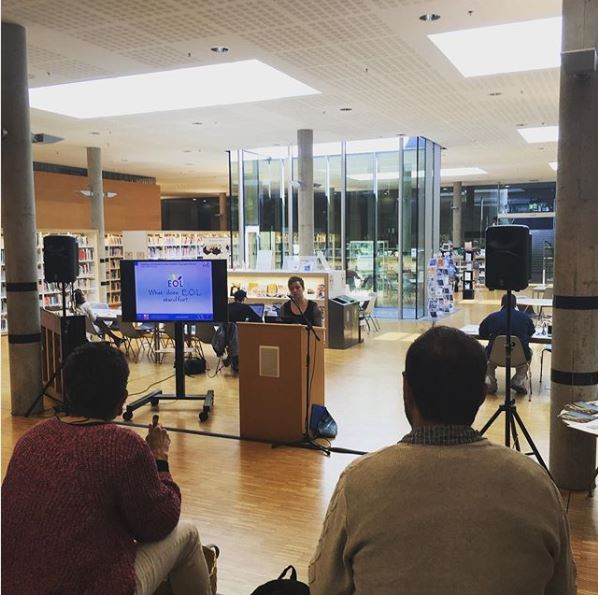 The ECML project “Learning environments where modern languages flourish“ (2016-2019) seeks through and for languages to strengthen the development both of social competences and competences for democratic citizenship.
The ECML project “Learning environments where modern languages flourish“ (2016-2019) seeks through and for languages to strengthen the development both of social competences and competences for democratic citizenship.
On 29 May, Solena Pradayrol, French adviser at Fremmedspråksenteret.no and National Contact Point for the ECML in Norway, presented this project at the faculty Høgskole i Østfold in Halden. The public event offered an opportunity for some 20 teachers, researchers and students to familiarise themselves with the EOL approach. The initiative took place within the framework of the #språkfika project which aims to promote languages through presentations of university language teachers once a week during the lunch break.
The EOL matrix, one of the key outputs, gives an overview over different fields and areas which might support schools developing learning environments where modern languages flourish. By matching 4 “environmental levels” with 5 dimensions of language learning, the matrix should help schools identifying new opportunities for and through languages. The goal is modelling your school towards a language friendly learning environment.
The Matrix is currently available in English, French, German, Greek, Norwegian and Spanish. It will be connected to a glossary and different tools and resources. All EOL project outputs will be available online in the course of 2019.
Related links
16.04.2019
Tools and resources for changing schools into places where languages flourish: available online in the course of 2019
The ECML EOL project (www.ecml.at/learningenvironments) held a workshop on the 7th and 8th of March with 28 participants from 28 countries plus the project team. Jonas Erin from France is the coordinator and the team members are Lea Štiberc from Slovenia, Silvia Minardi from Italy and Kristin Brogan from Ireland. The workshop was joined by three special guests: Marisa Cavalli from Italy as the ECML consultant; Génaël Valet from the French Ministry of Education, an expert for the online training platform M@gistere, and Leslie Neumann from TU-Darmstadt University who presented her current research.
The main goal of the workshop was to share the outcomes of the project with participants from member states and to receive feedback on the EOL tools that had been developed by the team and with the vital support of the ECML team.
Among the tools the team has been developing, there is an online course which can be used to start creating learning environments where languages flourish. The schedule of the workshop was strictly based on the different steps of the online course, i.e
- Step 1: What are learning environments?
- Step 2: How to design priorities
- Step 3: How to define new strategies
- Step 4: What research underpins EOL?
- Step 5: How to set up a whole school plan
- Step 6: Assessing and training
- Step 7: Implementing EOL
Participants gave useful feedback on the various project tools – the Matrix, the TrEOL game, the memos, the case studies, the glossary and the action plans. This adds a quality check to these outputs which have also been piloted.
The project team will meet for the last time in April at the ECML in Graz and will discuss the final plans for this ambitious ECML project; for example, final adaptations of the outputs based on the feedback received. All project tools for teachers and the wider language community will be available on the website.
The overarching aim of this four year project has been to develop a vision of a language friendly environment, encourage a strategic approach to language teaching and learning and to provide tools and resources to all those who want to change their school into a place where languages can flourish.
The project team:
Jonas Erin (coordinator), Kristin Brogan, Silvia Minardi, Lea Štiberc
28.03.2019
“Learning environments where modern languages flourish” (EOL): dissemination workshop (Graz, Austria, 7-8 March 2019)
The dissemination workshop of the EOL project took place at the European Centre for Modern Languages (ECML) in Graz on 7-8 March 2019. It brought together participants from 28 out of the 33 Council of Europe member states signatories of the Partial Agreement on development of language education.
The EOL project is an action research project of the ECML which is part of the four year programme entitled “Languages at the heart of learning”. The project, strongly supported by the Ministry of National Education, Higher Education and Research of France aims to meet the needs of the member states, concerning in particular the attractiveness and efficiency of language learning.
More than a hundred schools from 16 European countries are part of the network on which the work carried out during 4 years (2016-2019) was based. The collective intelligence of the network and the numerous stakeholders mobilised around schools – researchers, inspectors, trainers, professors – provided the following deliverables:
- an online training course for teachers and headmasters;
- a website containing more than fifty tools, resources from schools, science popularisation sheets, etc;
- a research text for publication by the ECML.
The workshop was based on a participative approach that involved participants, representatives of their countries, in witnessing and valuing the specificities of their countries’ learning environments. An enriched presentation was organised in order to mobilise the participants:
- Upstream, in the presentation of their educational context, expectations and reading of the issues related to learning environments;
- Downstream, in the experimentation of the EOL project on the French platform M@gistere and the valorization of their contributions on the European project site.
The workshop was conducted around four aspects of dissemination of the project:
- Access the general philosophy of the project
- Definition of learning environments
- Presentation of the EOL matrix by measuring the extent of the issues
- Understanding the change management processes
- Symbiotic approach to language issues at the school level
- Research results
- Development of an implementation strategy adapted to the context of each individual
- Development of a linguistic plan for a school
- Collaborative writing of an action plan
- Dissemination of the project through stakeholder training
- Project management and the contributions of hybridisation
- Valorisation of skills, stakeholders and schools
The dissemination workshop had three objectives:
- Share through the results of the EOL project the values promoted by the Council of Europe – Human Rights, the Rule of Law and Democracy – and the richness of the ECML projects
- Allow participants to access the EOL project and equip them for the dissemination of the project
- Expand the European EOL network
The survey carried out by the ECML at the end of the workshop shows that the EOL project received a very favourable reception, not only in its context but also in its operationalisation and the development of a European intelligence of language-related learning environments.
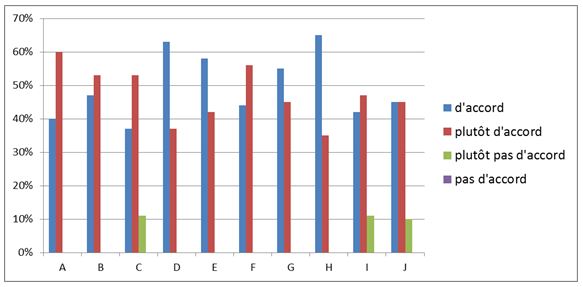
A. The topic of this workshop was relevant to the context of my work.
B. The presented approaches and materials are useful for my work.
C. I am convinced that learners in my country can benefit from the implementation of the presented approaches and materials.
D. The materials and approaches discussed at this workshop help me to promote plurilingual, intercultural and inclusive learning.
E. This workshop has given me ideas on how access to quality education for all learners can be improved.
F. I think this workshop is relevant for my country as it addresses current needs in language education.
G. This workshop has developed my professional competence further.
H. This workshop has motivated me to become more active in networking with the professional community.
I. This workshop encouraged me to play a more influential role in reform processes in my professional environment.
J. This workshop highlighted quality aspects of language education that I will promote in my professional environment.
By the end of 2019, the EOL project website www.ecml.at/learningenvironments will be available in three languages: French, English and German.
The project team:
Jonas Erin (coordinator), Kristin Brogan, Silvia Minardi, Lea Štiberc
08.03.2019
“Learning environments where modern languages flourish”: tools and resources tested by 28 participants from 28 countries
28 participants from 28 member countries discovered and tested tools and resources developed by the ECML project “Learning environments where modern languages flourish ” (EOL). The key challenge of the project is to support schools that wish to establish language friendly learning environments which promote the exchange of related resources, research and practice. Participants had the opportunity to familiarise themselves with the holistic approach to language education that is at the heart of the EOL project.
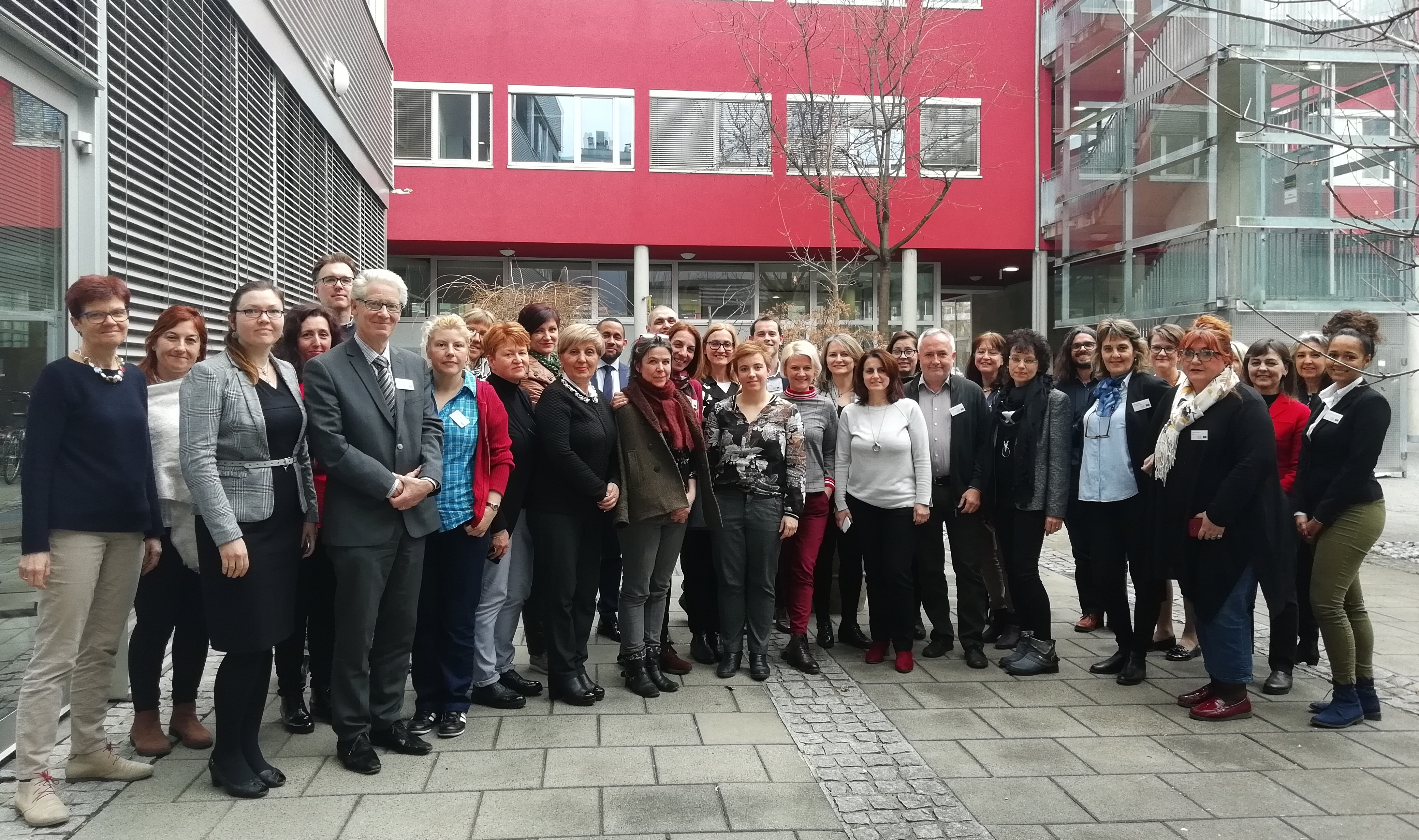
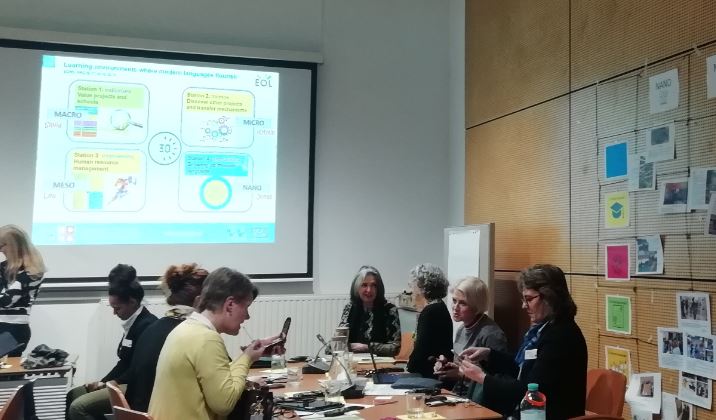
30.01.2019
2018 – ein bedeutendes Jahr für EOL
2018 war ein wichtiges Jahr für das EOL-Projekt. Durch den Einsatz des Projektteams hat sich der innovative Ansatz des Projekts unter den Partnerschulen und darüber hinaus verbreitet. Schulen können jetzt sehen und erleben, wie sie mit einem ganzheitlichen Ansatz Sprachenbildung fördern können.
Das Netzwerktreffen, das dieses Jahr im EFSZ stattfand, trug dazu bei, die Schlüsselrolle der Partnerschulen im Gesamtprojekt zu stärken. Alle Werkzeuge des Projekts wurden dank der Teilnehmenden konsolidiert. Eine Datenerhebung an Partnerschulen half, das Qualitätsmanagement des Projekts zu verfeinern. Das EOL-Projekt bietet eine komplette Palette von Werkzeugen http://eol.ecml.at: eine Matrix und Matrixfragen, eine innovative Methode zur Förderung der Zusammenarbeit, Memos, die Information zu vielen anderen EFSZ-Projekten liefern, ein Glossar, Indikatoren usw.
Das EOL-Projekt wurde in mehreren Ländern vorgestellt:
- In Agrinio (Griechenland) stand EOL im Mittelpunkt einer Schulungskonferenz für Lehrer, Schulleiter und Inspektoren.
- In Bad Hofgastein (Österreich) war EOL Teil eines Workshops für SprachlehrerInnen aus der beruflichen Bildung während des CEBS-Seminars (Center für berufsbezogene Sprachen).
- in Kopenhagen (Dänemark) unterstützte EOL die Fortbildung dänischer FranzösischlehrerInnen.
- In Saarbrücken (Deutschland) half EOL mit, das deutsch-französische Gymnasium in Bezug auf interkulturelle Schullaufbahnen zu begleiten.
- In Poitiers (Frankreich) wird EOL bei der Schulung von InspektorInnen eingesetzt.
Das EOL-Projekt befindet sich jetzt in der letzten Entwicklungsphase. Das Team arbeitet sowohl an der Erstellung der Publikation als auch am Aufbau der Online-Trainingsplattform. Die Arbeit am Projekt wird auch rund um den Innovationstransfer organisiert. Dieses Projekt wird derzeit auch in anderen Gebieten umgesetzt, beispielsweise auf Martinique auf den französischen Antillen. Die Matrix wurde auf andere Themen übertragen, wie etwa im Bereich der Kompetenzen für eine demokratische Kultur (Europarat) oder die Förderung von Innovation im Bildungsbereich.
Darüber hinaus wird mit dem EFSZ die Gestaltung eines Qualitätslabels diskutiert.
Das Team freut sich darauf, die Ergebnisse des Projekts während des für den 7. und 8. März 2019 geplanten Workshops mit interessierten KollegInnen zu teilen.
Information zur Teilnahme an diesem Workshop finden Sie hier.
Das Projektteam:
Jonas Erin (Projektkoordinator), Kristin Brogan, Silvia Minardi, Lea Štiberc
Projektwebseite "Fremdsprachenfreundliche Lernumgebungen" (verfügbar auf Deutsch, Englisch und Französisch: http://eol.ecml.at/
13.06.2018
Just published : Courriel européen des langues – Issue no. 40, the e-magazine of the National Contact point for the ECML in France
The “Courriel européen des langues”, the online magazine which is edited twice a year by the International Centre for Pedagogical Studies (CIEP), has been relaunched with renewed contents and a refreshing layout. The current issue highlights 6 ongoing ECML projects, giving the floor to the project coordinators and a project team member, as well as to teachers in the field. In addition, the National Contact Point for the ECML highlights the new national language strategy in Denmark. Finally, a section presents 11 recent resources (online materials, publications).
The Courriel is disseminated in French on the CIEP website and on its LISEO portal (see dedicated section “Courriel européen des langues”). You can subscribe for free to the Magazine and find the archives here: http://www.ciep.fr/lettres-information/courriel-europeen-langues.
Contents of Issue no. 40 – May 2018 (only available in French):
Focus sur le projet EOL
- EOL – Des environnements d’apprentissage optimisés pour et par les langues
Article de Jonas ERIN, Inspecteur général de l’éducation nationale, coordinateur européen du projet EOL
- Témoignages
- Le projet EOL au collège André Chénier (Carcassonne)
Témoignage d’Émilie Courtejaire, avec la collaboration de Selvi Gras, professeur d’anglais et professeur d’espagnol au collège André Chénier, coordinatrice du projet EOL pour le collège
- Le projet EOL au lycée Les 7 Mares (Maurepas)
Témoignage de Noëlle Sédilot-Gasmi, Professeure d’espagnole et coordinatrice de la discipline, initiatrice et coordinatrice du projet EOL pour le lycée
Autres projets du CELV
- Le projet e-lang - Vers une littératie numérique pour l’enseignement et l’apprentissage des langues
Article de Christian Ollivier, Professeur des universités à l’université de La Réunion, coordinateur du projet e-lang
- La/les langue(s) de scolarisation : une feuille de route pour les établissements scolaires
Article de Rebecca DAHM, Maître de conférences en didactique des langues, ESPE Midi-Pyrénées – Université Toulouse-Jean Jaurès, coordinatrice du projet Langue(s) de scolarisation
- Le projet QualiMatrix dans sa dernière année de développement
Article de Gudrun ERICKSON, University of Gothenburg, Department of Education and Special Education, documentaliste du projet QualiMatrix
Actualités
- Développer la conscience linguistique dans les matières scolaires : appel à contribution pour les enseignants de DNL
- Vers un Cadre européen commun de référence pour les enseignants de langues : trois instruments à l’honneur en 2018
- La Gazette européenne des langues
L’enseignement des langues au Danemark
- Entretien avec Ana Kanareva-Dimitrovska, point de contact national du Danemark
Propos recueillis par Marion Latour et Bernadette Plumelle
Ressources
- À explorer sur internet
- Label européen des langues : EUROBAC
- Écrire en plusieurs langues : dossier réactualisé « Intégrer le numérique en classes de langues »
- Dossier thématique « La mémorisation : Dans quelle mesure le numérique permet-il de créer des situations d’apprentissage efficace ? »
- Audio Lingua : 5 000 fichiers audio en 13 langues
- Radio Garden : écouter en direct toutes les radios nationales, locales ou web du monde
- 7 nouveaux kits eTwinning pour monter un projet eTwinning
- Vient de paraître
24.05.2018
EOL keynote and workshop "Strengthening synergies between practice, research and policy" (Agrinio, Greece, 11 May 2018)
The Greek Ministry for Education and Religious Affairs requested the expertise of the European Centre for Modern Languages (ECML) to support the implementation of important changes in policy and practice in language education, as it moves towards a more holistic approach which responds to constantly evolving needs of both learners and teachers. The current political and social context of migration together with the impact of electronic communication have resulted in increased linguistic and cultural diversity in Greek classrooms.
Organised by the Regional Directorate for Primary and Secondary Education in Western Greece and held in the music school of Agrinio, the conference included three other short presentations and a workshop which brought together 37 professionals: 25 teachers, 5 headmasters, 5 school advisors, Mr BARIS (Head of Scientific and Pedagogical Guidance for Primary Education at the Regional Directorate of Education in Western Greece) and Mr GIANNOPOULOS (Regional Director for Primary and Secondary Education in Western Greece).
The event was perfectly organised and coordinated by Ms Olympia TSOLOU.
The request to the ECML goes even further in order:
- “to replace present models which have been developed on the basis of a monolingual ethos of communication and monolingual pedagogical practices, serving ideologies of linguistic and cultural hegemony;
- to foster the development of alternative pedagogic discourses and practices for the teaching and learning of languages aiming at the interlinguistic and intercultural communication competences of European citizens;
- to ensure that all involved in the programme appreciate their responsibility for providing their students with opportunities to learn a variety of languages, and also for providing opportunities for alternative education and training of language-teaching instructors;
- to provide foreign language education for students in primary and secondary schools an education that must be linked with the teaching of their own mother tongue through a critical model of multilingual literacy”.
The systemic nature of the EOL project Learning Environments where modern languages flourish aligns well with the complexity of these issues.
EOL offers a global approach to language matters by considering how objectives for modern languages relate to concerns about the language(s) of schooling and the linguistic components in all curriculum subjects.
EOL proposes a transversal vision and a symbiotic approach to learning languages, teaching languages and teaching content by integrating languages and to managing schools and developing school systems.
This is the reason why the ECML proposed Jonas Erin, project coordinator of EOL, to support the Greek authorities. Jonas’ input at this event also gave him a great opportunity to test tools and resources that are still in development within the EOL project.
The preparation of the seminar was based on the participants’ answers to a questionnaire around their understanding of learning environments and current needs. The results highlighted great interest in the values of the Council of Europe, embodied in the work of the ECML. Moreover, three major issues emerged which show how important it is to develop a systemic approach to language education:
- An urgent social need:
How can foreign language learning become an efficient lever for social inclusion and advancement?
- The need for language learning pathways:
How can a culture of individualized language learning pathways be developed within the perspective of democratic citizenship?
- An issue of professional development:
What contribution can modern languages and European cooperation in education make towards professional development?
These issues were then addressed at the conference via the following three themes:
1. The values underpinning the Council of Europe’s language education policy
The three founding pillars of the Council of Europe - democracy, human rights and rule of law - set the scene for reflection on the specific role of language education and converged in the welcoming message of the Greek authorities on European integration, the video presentation on the Council’s values and the ECML’s activities by Sarah Breslin, Executive Director of the ECML and Jonas ERIN’s keynote - How to strengthen synergies between practice, research and policy?. The presentation of different resources and projects of the ECML helped to give a practical illustration of how language education contributes to these values.
2. Research in the field of plurilingualism
The presentation of research elements in the field of language acquisition was well appreciated: Ms CHRISTOPOULOU spoke about linguistic diversity and plurilingualism, Mr Erin about the factorial model of language acquisition theories (“How to stop the drift away of practice, research and policy”) and Ms TSOLOU concluded on translanguaging.
3. The professional development of actors and structures
Supporting changes in practice and policy by emphasizing plurilingual and intercultural education was at the heart of the seminar: making teachers and head teachers more conscious of the importance of global language awareness (keynote), developing collaborative approaches (workshop), presenting multimodal approaches (presentation of Ms KOTADAKI on Digital Storytelling).
The quest for coherence and convergence when planning language learning pathways was the baseline of the diverse contributions to this seminar.
Participants actively challenged their notions of learning environments, shared ideas and developed new strategies by linking personal, cultural and structural aspects.
Beyond the scientific and conceptual input, the following tools and resources were used and/or presented:
|
Resources of the EOL project
|
Other resources and projects
|
- The EOL matrix (EOL-E-10)
- The TrEOL tool (EOL-E-25)
- The matrix questions
- The memos (EOL-E-25)
- The profiling test (EOL-E-25)
- The action plan (EOL-E-13)
- The implementation strategies (EOL-E-26)
- Examples of projects (EOL-E-27)
|
|
The impact and global reach of the ECML
The participants’ feedback was positive:
- The numerous questions on how to contribute to the ECML activities (in workshops or as project member) reveal a great interest in the ECML in general;
- The will of many participants to register on the EOL working platform and to join the network of partner schools is a very encouraging;
- The requests for bilateral cooperation between the Greek and the French school system illustrates the indirect mediation function of the ECML.
The TrEOL tool and its symbiotic approach to language matters were particularly well appreciated. The participants set up alternative strategies to implement a global approach to language education and identified opportunities for transversal cooperation and cross-subject synergies.
Finally Ms TSOLOU’s excellent organisation of the seminar and the amazing welcome shown to the ECML expert, Jonas Erin, are worthy of mention. The hospitality, the value given to the ECML in the introductory words of the Greek authorities (T. BARIS and Κ. GIANNOPOULOS), the strong commitment of school advisors and teachers to a common European education policy are evidence of profound support for the ECML’s work and for the Council of Europe’s values. The excellent example of the Greek welcoming culture should be incorporated into the final proposals of the EOL project, particularly in relation to the impact of incoming mobility on creating learning environments where modern languages flourish.
Programme of the seminar
ECML project website "EOL - Learning environments where modern languages flourish": English - French - German
Photo impressions of the seminar
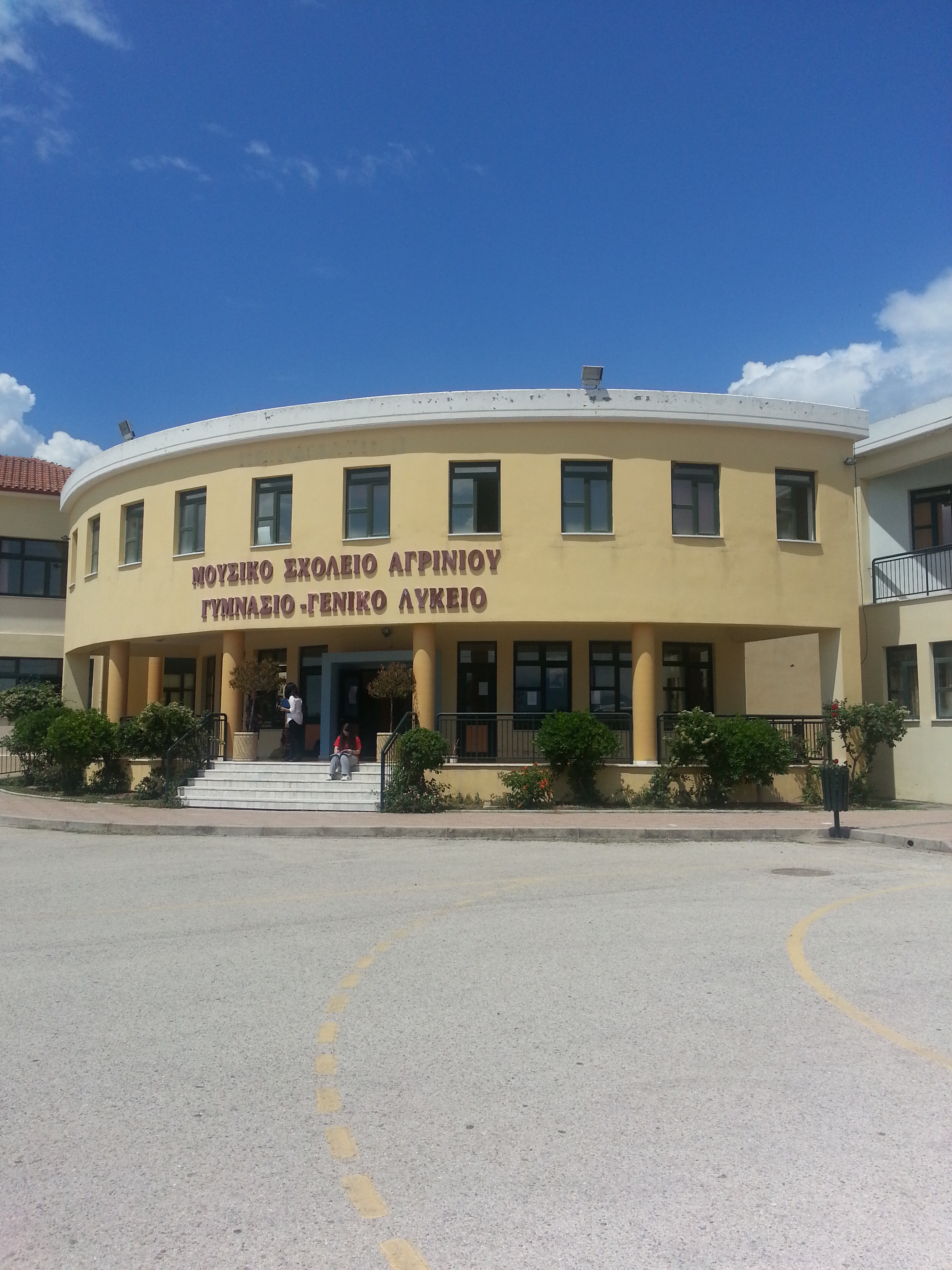
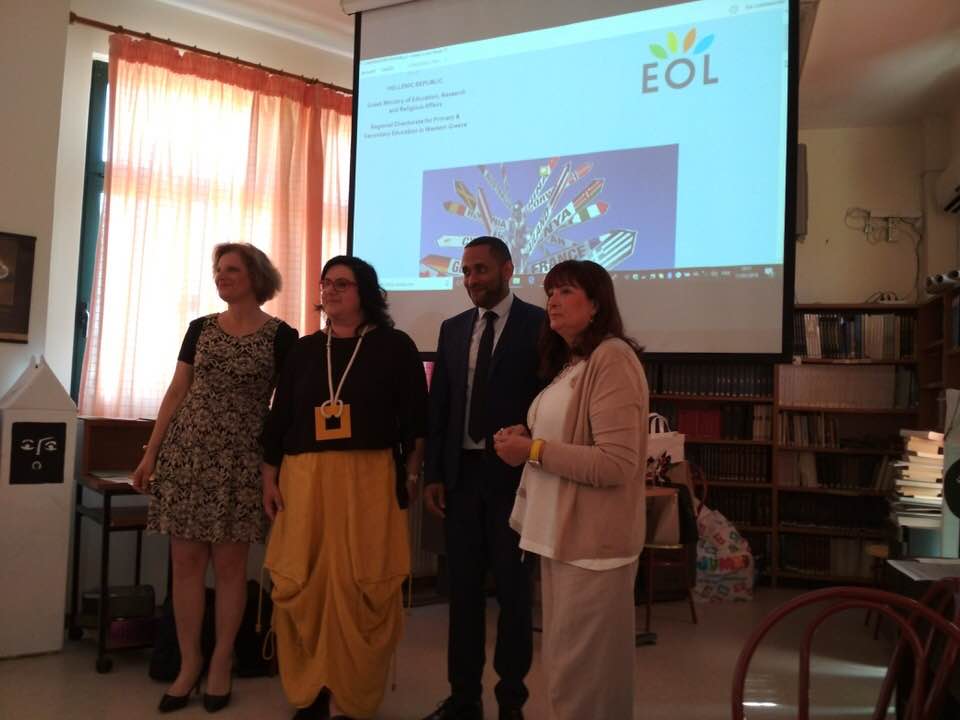
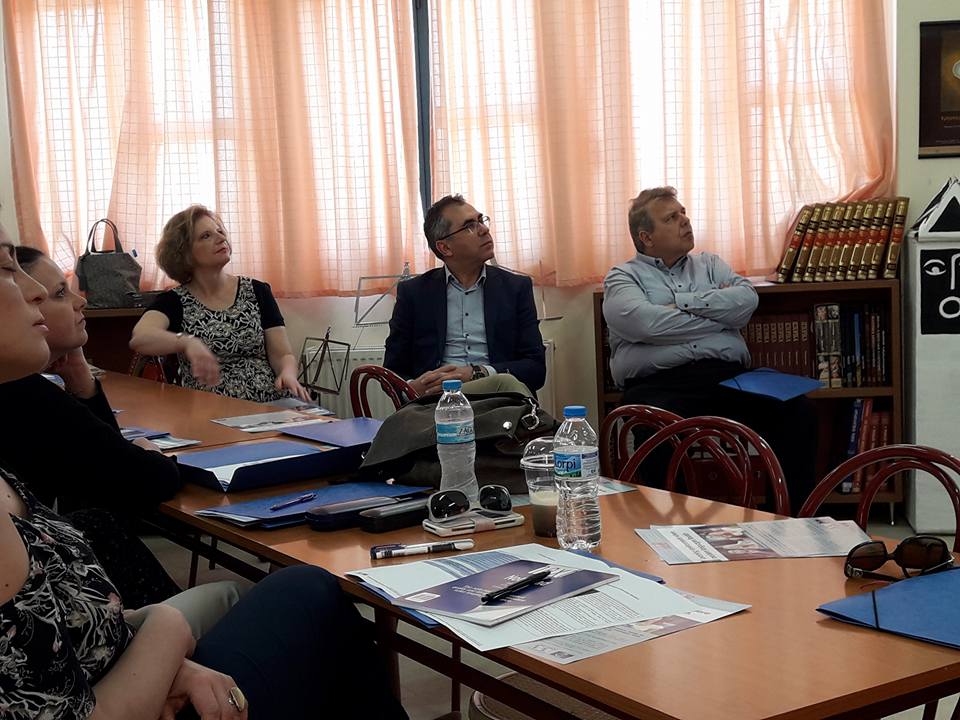
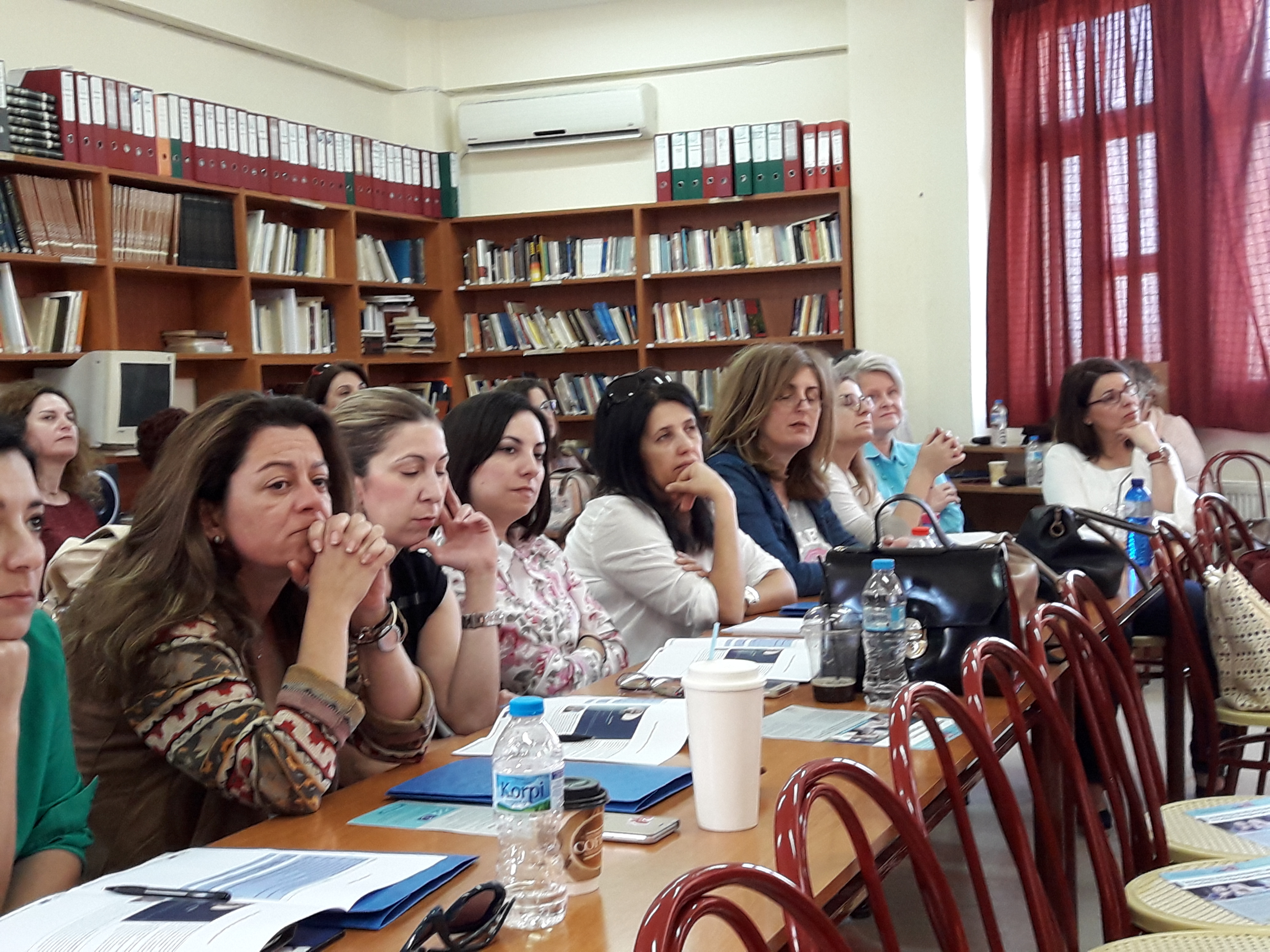
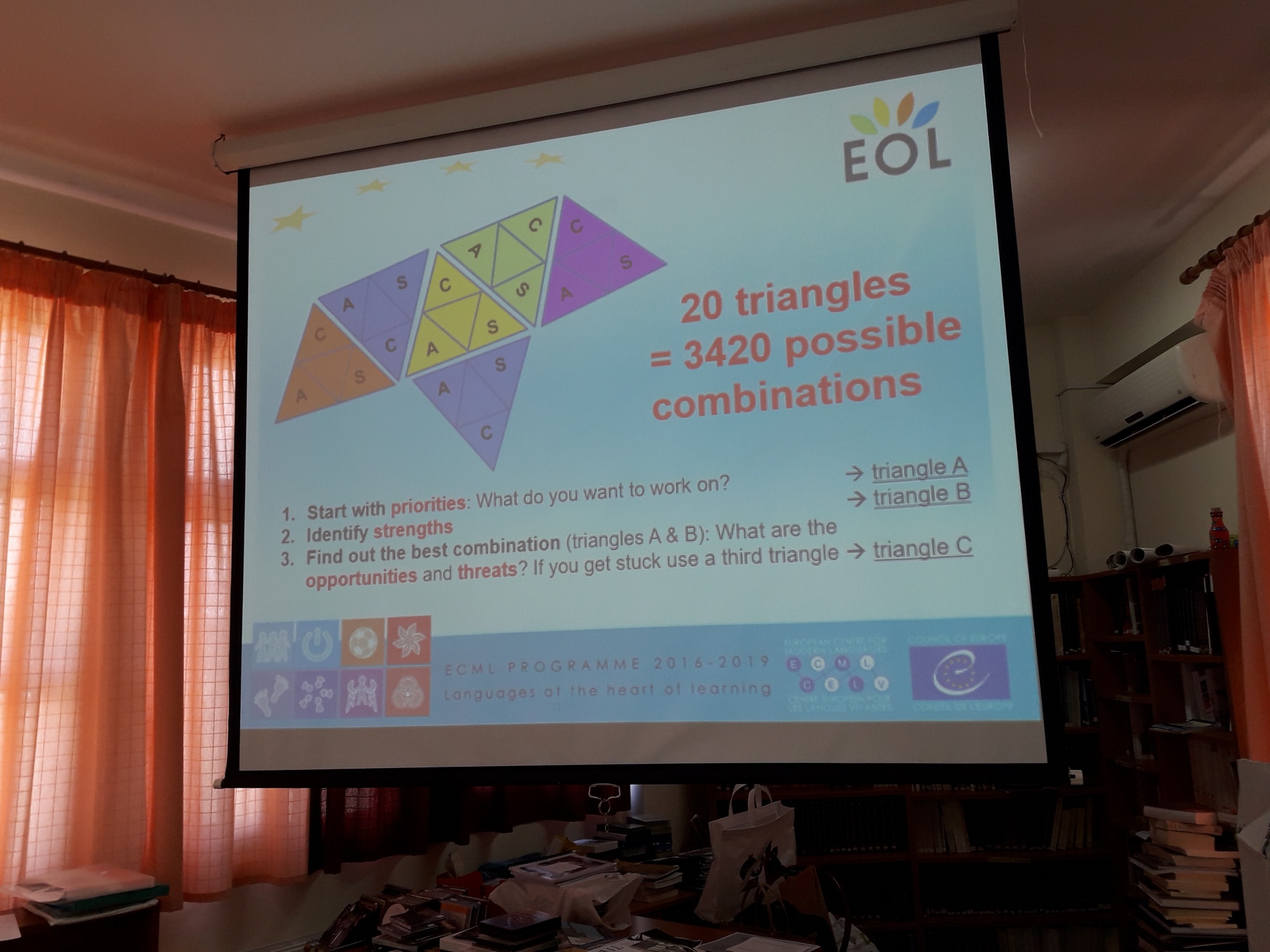
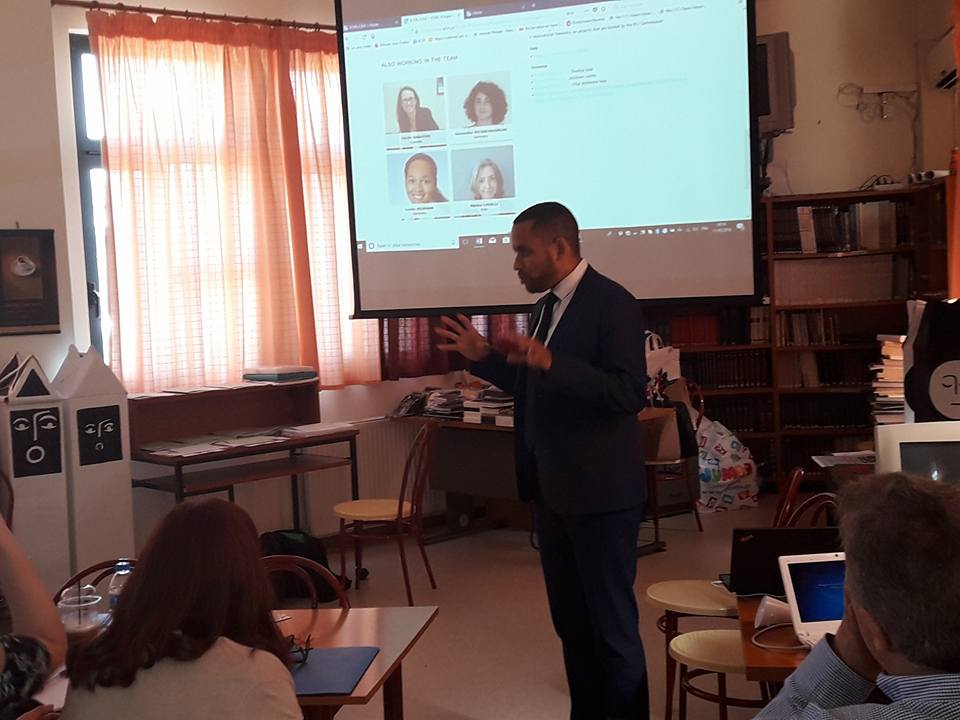
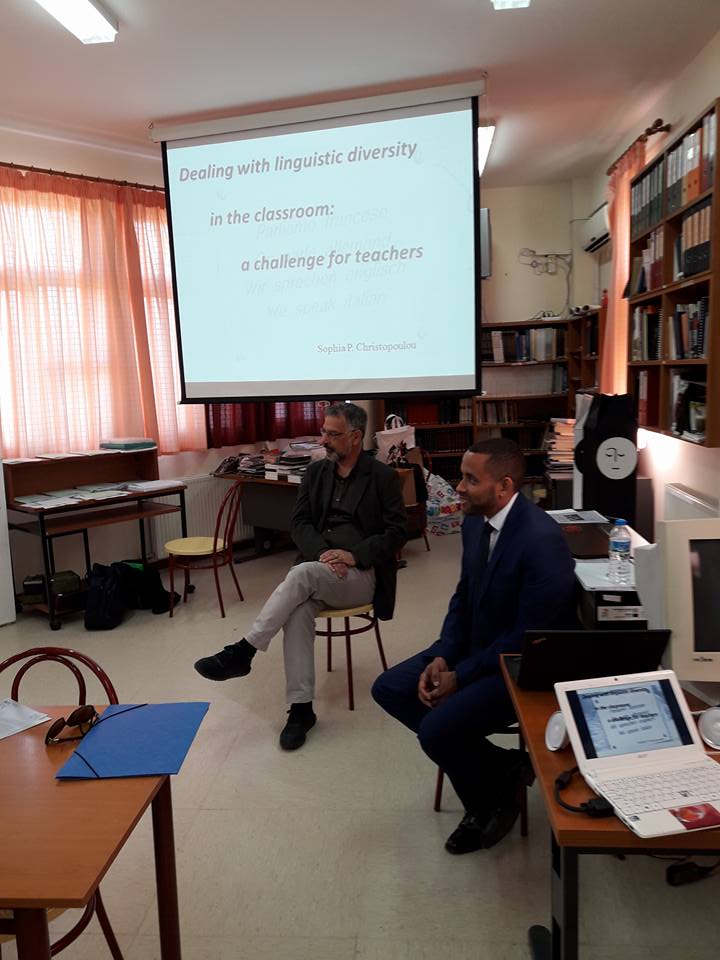
09.04.2018
"EOL - Learning environments where modern languages flourish": the network meeting (Graz, 20-21 March 2018), a key step for the ECML project
The EOL network meeting took place at the ECML in Graz on 20-21 March. The network meeting is a key step for each ECML project as it provides an opportunity to get direct feedback from different experts on tools, resources and developed approaches.
The team carefully selected the participants according to their expertise and geographical professional background. The network meeting brought together teachers from partner schools, school principals, institutional representatives and researchers. The team had also the pleasure to welcome Flore Schank, coordinator of the project Inspiring language learning and teaching in the early years, and Angela Gallagher-Bretts, team member of the project Action Research Communities.
The EOL project is in its third year of development. The concepts are consolidated, the working environment (European network, working platform, forum, etc.) is adapted to the needs. The tools have nearly all been set up, the work on resources has been launched and the research data collection is almost complete.
The drafting of the final publication, the development of the training platform, the labelling process and the dissemination activities (workshop, conference), as well as the training and consultancy offer still remain to be accomplished.
The overall structure of the network meeting was reflected in the seven steps of the EOL training path:
- Step 1: Becoming familiar with Council of Europe values, learning environments and language policies;
- Step 2: Focusing on priorities MATRIX + TrEOL game;
- Step 3: Defining strategies built on case studies per group (Matrix questions);
- Step 4: Browsing for resources;
- Step 5: Testing the masterplan;
- Step 6: Implementing EOL Online training pathways; and
- Step 7: Collaborating.
Most enjoyable was the newly designed TrEOL game; playfully being able to analyse and to discover what is needed in order to create an environment that is supporting language learning and teaching. The main components are structures, people and culture.
The network meeting gave participants the opportunity to share reflections and analyse the project through four key entries:
- modern languages as a key for human ecology (matrix);
- using the card game “TrEOL”, a symbiotic, win-win approach to considering how modern languages can help address key challenges in education;
- interconnections and their role to enhance all “synapsis” of school systems (memos, glossary, resources);
- stakeholders’ and schools’ professional development (indicators, transfer tool and training platform).
If participants support the philosophy of the EOL project and see its benefits in their own working context, there are two types of critical feedback:
- methodology: participants made proposals to make the personal and collective path on learning environments more progressive;
- strategy: participants gave several suggestions on how to improve communication on EOL and to make the different tools more easily accessible.
In the end, the main elements of the project’s dissemination are: making publications user friendly, choosing a progressive approach and selecting easy access resources. The research part and the links to other ECML projects have been deeply appreciated by participants and should find a place in the final publication. The participants’ feedback is very encouraging and gives the team a great inspiration to finalise tools and resources.
|
|
Matrix
|
TrEOL
|
Questionnaires
|
Glossary
|
Website
|
|
Relevance
|
Good
|
Excellent
|
Excellent
|
Excellent
|
Excellent
|
|
Clarity
|
Good
|
Good
|
Good
|
Excellent
|
To be improved
|
|
Innovation
|
Excellent
|
Excellent
|
Good
|
Excellent
|
To be improved
|
|
Effectiveness
|
Good
|
Excellent
|
Good
|
Excellent
|
Good
|
|
Design
|
Excellent
|
To be improved
|
Good
|
Excellent
|
To be improved
|
|
|
Memos
|
Masterplan
|
Indicators
|
Transfer
|
Platform
|
|
Relevance
|
Excellent
|
Good
|
Excellent
|
Excellent
|
Good
|
|
Clarity
|
Excellent
|
Good
|
Good
|
To be improved
|
To be improved
|
|
Innovation
|
Excellent
|
Good
|
Good
|
Good
|
Good
|
|
Effectiveness
|
Excellent
|
Good
|
Good
|
Good
|
Good
|
|
Design
|
Excellent
|
Good
|
Good
|
To be improved
|
To be improved
|
The project team:
Jonas Erin (coordinator), Kristin Brogan, Silvia Minardi, Lea Štiberc
Website of the project "Learning environments where modern languages flourish" (available in English, French and German): http://eol.ecml.at/
12.02.2018
Intense and fruitful exchange of ideas on future developments in language education
The 2-day meeting (6-7 February 2018) at the ECML in Graz, Austria, was an excellent opportunity for the ECML project experts to discuss ongoing project developments with their fellow project coordinators.
They explored synergies between the different projects and exchanged good practice in project methodology. They discussed ongoing work on the development of their products and how to best disseminate the wide range of final results which will be achieved by the end of 2018 and 2019. They reflected on critical success factors to promote the achievements across and at the end of their respective project life cycles, to implement, to mediate, to possibly further develop them and to maximise impact in the various national and individual contexts. Finally they shared initial ideas for both the contents and the structure of the next ECML programme (2020-2023). They also highlighted the added value, both professional and personal, of coordinating ECML projects, seeing this as an opportunity to bridge policy, research and practice and contribute to making a real difference to quality language education in Europe.
Impressions of the meeting (photo gallery on Facebook)
Current ECML programme of activities 2016-2019: "Languages at the heart of learning"
05.02.2018
ECML project “EOL – Learning environments where modern languages flourish”: matrix and tools soon available to be tested by partner schools
Expert meeting, Graz, Austria, 15-16 January 2018
The focus of the fifth EOL expert meeting was the action research linked to the project. The team discussed:
- the identification of success factors of language learning environments;
- and the quality indicators for language learning environments.
The matrix and the different tools linked to the matrix (matrix scale, matrix questions, etc.) will soon be finalised and published on the working platform in order to be tested by the partner schools. All resources from the partner schools published on the working platform will be indexed with reference to a matrix field. A search engine based on educational level, theme and desired outcome will help finding resources from the partner schools.
With the purpose of fostering collaboration within the school communities, the team developed a tool called SPOT (standing for Strengths, Priorities, Opportunities, Threats) which will be tested during the forthcoming network meeting in March. This tool helps stakeholders to interconnect people, structures and culture and design a common strategy on language learning environments where modern languages flourish. The tool illustrates in a very concrete way how and why a holistic approach can foster language education.
The next steps for the expert team are:
- illustrating the EOL holistic approach to modern languages with concrete examples;
- finalising the quality indicators and reflecting on labelling strategies;
- preparing the network meeting (March 2018).
The project team:
Jonas Erin (coordinator), Kristin Brogan, Silvia Minardi, Lea Štiberc
11.01.2018
Fremdsprachenfreundliche Lernumgebungen (EOL): Dezember Newsletter 2017
In diesem Jahr fanden für das Team zwei Expertentreffen in Graz statt (Februar und September 2017). Bei diesen Treffen ging es sowohl um die Gesamtentwicklung des Projekts als auch um die Kommunikation mit den Partnerschulen sowie die Feinarbeit an den verschiedenen Tools auf der Arbeitsplattform des Projekts. Mehr als 70 Schulen aus 13 Ländern haben sich bereits dem Netzwerk angeschlossen und haben damit Zugriff auf Planungstools (Aktionsplan, Synopsis, Kalender), Kommunikationsmittel (Forum, Webseminar) und spezifische Inhalte (Memos, Matrix, Ressourcen anderer Schulen usw.).
EOL-Partnerschulen erhielten auch die Gelegenheit am Online-MOOC “Making professional videos with your smartphone” der Gobelins-Schule für Medien (November – Dezember 2017) mitzumachen und werden im Frühjahr 2018 ein Selbstevaluierungstool testen, welches vom EFSZ-Projektteam „Ein Wegweiser für Schulen zur Förderung der Unterrichtssprache(n)“ entwickelt wurde. Das EOL-Team war auch darauf bedacht, die zukünftige Kommunikation mit den Partnerschulen auch in Hinsicht auf das vom 19. bis 21. März anstehenden Netzwerk-Event voranzubringen.
In Laufe des Jahres 2017 wurden zwei Webseminare angeboten, im Mai und September, zu denen alle Partnerschulen eingeladen waren. Das erste Webseminar war auf die Präsentation des Projekts fokussiert. Im zweiten Webseminar konnte das Team die Arbeitsplattform und verschiedene Tools vorstellen. Zwei unserer Partner konnten ihre Arbeit präsentieren: Severine Poc (Berck, France) hat ein Video zum Thema “augmented reality” gezeigt und Olivier Launay (Rouen, France) hat eine Analyse zum Einfluss von EOL auf die Bildungspolitik angeboten. Eine Videoaufnahme des Webseminars ist auf der Arbeitsplattform abrufbar.
Das EOL-Projekt hat in der Tat bereits einen beeindruckenden Einfluss auf die Schulpraxis in Frankreich indem Eltern miteinbezogen, neue Partnerschaften geschlossen und Netzwerke erweitert werden, wobei alle Ebenen beteiligt sind und Mehrsprachigkeit aufgewertet wird.
Partnerschulen werden zurzeit gebeten, dem Team den Aktionsplan zu ihrem Schulprojekt zu senden und ihr Projekt weiterzuentwickeln. Die Ergebnisse werden auf die Arbeitsplattform geladen und bilden wunderbare Beispiele guter Zusammenarbeit.
Neben der Entwicklung ihres eigenen EOL-Projekts bitten wir Partnerschulen auch Ressourcen mit dem EOL-Netzwerk (Team und anderen Partnerschulen) zu teilen und ihre Strategien zur Entfaltung einer Gesamtschulsprachpolitik zu vertiefen.
Ein weiteres Expertentreffen im Januar 2018 wird dem Team die Möglichkeit geben, das Netzwerktreffen vorzubereiten. Die Zusammenarbeit mit den Partnerschulen ist das Herzstück der Projektentwicklung, deren Hauptziel es nun ist, Erfolgsfaktoren zu EOL herauszuarbeiten. Die Faktoren werden in die Erarbeitung von Indikatoren einfließen. In den Überlegungen zu EOL-Modellen stellten wir einen Bedarf an einfachen Tools fest, um den Einfluss von Lernumgebungen auf Lernende zu zeigen, denn die Entwicklung fremdsprachenfreundlicher Lernumgebungen ist das Hauptanliegen von EOL. Eine weitere wichtige Aufgabe ist die Entwicklung eines EOL-Ansatzes für Fremdsprachen.
Jonas Erin & Kristin Brogan
09.05.2017
EOL-Netzwerk “Fremdsprachenfreundliche Lernumgebungen”: 99 Partnerschulen registriert
Das EFSZ-Projekt EOL “Fremdsprachenfreundliche Lernumgebungen” zählt bereits 99 Partnerschulen und -lehrkräfte aus zehn verschiedenen Ländern. Neue Mitglieder werden noch bis Ende Juli 2017 aufgenommen.
Partnerschulen müssen sich online auf der Arbeitsplattform des Projekts registrieren.
Dieses europäische Netzwerk von Projektpartnerschulen ermöglicht nicht nur gegenseitige Unterstützung in der Entwicklung innovativer Ansätze zur Implementierung einer fremdsprachenfreundlichen Lernumgebung durch den Austausch relevanter Ressourcen in Forschung und Praxis, sondern bietet auch individuelle Begleitung der verschiedenen Schulprojekte durch das ExpertInnenteam.
Schulen, die die Fragestellung für ihr Projekt noch nicht festgelegt haben, können sich von Projektthemen anderer Partnerschulen inspirieren lassen. Einige französische Partnerschulen haben z.B. bereits damit begonnen, ihre Projektideen zu teilen und sind bereit, ihre Projekte mit Schulen aus anderen europäischen Ländern zu vertiefen und zu erweitern.
Der „Aktionsplan“ ist ein wichtiges Instrument für im Projekt involvierte Lehrkräfte. Einmal ausgefüllt ergibt sich daraus eine übersichtliche Darstellung der verschiedenen Projektetappen. Partnerschulen können somit alle von ihnen geplanten Aktivitäten gut verfolgen. So sind alle von den Partnerschulen entwickelten Ressourcen dem gesamten Netzwerk zugänglich. Und natürlich wird unseren Partnerschulen eine Schlüsselrolle in der Pilotierung der vom Projektteam entwickelten Matrix zukommen.
Sämtliche Projektprodukte wie z.B. die Übersicht der Projektthemen, der Aktionsplan, das Glossar und die Matrix stehen auf der Projektwebseite zur Verfügung. Beim 3. Expertentreffen iam EFSZ in Graz im Februar 2017 hat das Team intensiv an der Erstellung zahlreicher Instrumente gearbeitet. Ganz im Sinne der Mehrsprachigkeit wird die gesamte Projektdokumentation auf Deutsch, Französisch und auf Englisch produziert. Dies ist gewiss keine geringe Herausforderung, aber dank der mitreißenden Energie des Projektkoordinators Jonas Erin aus Frankreich und dem Engagement des Teams scheint alles möglich zu sein!
Beim letzten Expertentreffen waren nicht nur die vier Teammitglieder (Jonas Erin aus Frankreich, Silvia Minardi aus Italien, Kristin Brogan aus Irland und Lea Štiberc aus Slowenien), sondern auch Cécile Sabatier aus Canada anwesend, deren aktive und sachkundige Teilnahme vom Team sehr geschätzt wurde. Zu Gast war auch Monika Klamminger aus dem Seebacher Gymnasium in Graz. Es war eine wahre Freude, sich mit ihr als Vertreterin einer unserer Partnerschulen über zukünftige Kooperationsmöglichkeit zu unterhalten.
Das Team ist für die stets unterstützende Hilfe und Begleitung des EFSZ – von der technischen Hilfeleistung bis hin zur konstruktiven Bewertung der Ergebnisse – sehr dankbar. Es ist ein tolles Gefühl zu wissen, dass alle fest davon überzeugt sind, dass dieses Projekt das Lehren und Lernen von Fremdsprachen entscheidend weiterführen wird.
Nun freut sich das Team auf die im Juni geplante Eröffnung des Online-Diskussionsforums für alle Partnerschulen. Gleichzeitig läuft die Vorbereitung eines internationalen Webseminars für alle Partnerschulen am 24. Mai 2017 (10.00 - 11.30 Uhr MEZ). Dies ist die perfekte Gelegenheit, um Fragen zu beantworten, die Partner kennenzulernen und Erwartungen abzuklären. Einige Schulen werden auch zum Netzwerktreffen am EFSZ in Graz im März 2018 eingeladen.
Links
22.11.2016
Learning environments where modern languages flourish - EOL annual report 2016
 The consideration of learning environments leads to the question of possible misalignment between school structures (learning spaces, equipment, systems) and school cultures (contents, methods, projects, etc.). In order to help schools develop a long-term inclusive, plurilingual and intercultural school policy, the EOL project team has been working on the best ways for schools to bring their structures and cultures together. For example, the project team created a matrix 1.0., which should help schools identify their strengths and their possibilities for development in the field of modern languages. This matrix also aims to highlight how languages can contribute to general, civic and European education.
The consideration of learning environments leads to the question of possible misalignment between school structures (learning spaces, equipment, systems) and school cultures (contents, methods, projects, etc.). In order to help schools develop a long-term inclusive, plurilingual and intercultural school policy, the EOL project team has been working on the best ways for schools to bring their structures and cultures together. For example, the project team created a matrix 1.0., which should help schools identify their strengths and their possibilities for development in the field of modern languages. This matrix also aims to highlight how languages can contribute to general, civic and European education.
In addition, the team created a range of resources which support cooperation with partner schools:
- Communication : website, flyer, logo
- Translations : all information is translated into the three working languages (German, French and English) and some resources are also available in Italian and Slovenian
- Cooperation: local and national networks have been set up; a wider European network is in progress
- Support: ongoing development of a glossary, mediation tools for previous projects (“tools for schools”) and resources to help schools with their own projects
The EOL project team is delighted to work with all stakeholders in education in order to develop learning environments where modern languages flourish. More than 40 schools are already involved in the EOL project. If you believe this could be of interest to you, please click on the following link:
http://eol.ecml.at/Jointhenetwork/tabid/4176/language/en-GB/Default.aspx
*****
Author: Jonas Erin, coordinator of the ECML project "Learning environments where modern languages flourish"
Website: www.ecml.at/Learningenvironments
GERMAN VERSION
Fremdsprachenfreundliche Lernumgebungen": EOL – Jahresbilanz 2016
Die Überlegung zu den Lernumgebungen stellt die Frage, ob die Schulstrukturen (Lernräume, Ausstattung, Schulformen, usw.) und den Schulkulturen (Inhalte, Methoden, Projekte, usw.) entsprechen. Um Schulen bei der nachhaltigen Entwicklung einer inklusiven, mehrsprachigen und interkulturellen Bildungspolitik zu begleiten, hat das EOL-Projektteam daraufhin gearbeitet, Konvergenzen zwischen Schulstruktur und -kultur zu optimieren. Aus dieser Arbeit wurde eine Matrix 1.0. erstellt, welche Schulen ermöglichen soll, ihre Stärken und ihr Entwicklungspotenzial im Bereich der Fremdsprachen besser hervorzuheben. Diese Matrix verfolgt auch das Ziel, den Beitrag der Sprachen zur allgemeinen, staatsbürgerlichen und europäischen Bildung der Schüler expliziter zu gestalten.
Neben dieser Grundsatzarbeit hat das Team Tools entwickelt, um eine Zusammenarbeit mit den Partnerschulen auf fruchtbarer Weise anzugehen:
- Kommunikation: Webseite, Flyer, Logo
- Übersetzung: alle Informationen sind in den drei Arbeitssprachen (Deutsch, Englisch, Französisch) verfügbar und einige Ressourcen sind auch auf Italienisch und Slowenisch erhältlich
- Kooperation: lokale und nationale Netzwerke sind eingerichtet worden; das erweiterte europäische Netzwerk steht in der Entwicklungsphase
- Begleitung: ein Glossar, Vermittlungstools von bereits absolvierten Projekten („Tools for Schools“) und Ressourcen zur Unterstützung der Schulprojekte sind in Vorbereitung.
Das EOL-Projektteam freut sich darüber mit allen Akteuren im Bildungsbereich zusammen zu arbeiten, um fremdsprachenfreundliche Lernumgebungen zu entwickeln. Mehr als 40 Schulen sind bereits im EOL-Projekt involviert. Wenn Sie auch Interesse haben, dann klicken Sie auf den folgenden Link.
Von Jonas Erin, Leiter des EFSZ-Projekts "Fremdsprachenfreundliche Lernumgebungen"
*****
Webseite: www.ecml.at/Learningenvironments
Projekt-Team und -Partner
29.04.2016
Fremdsprachenfreundliche Lernumgebungen
Das neue Projekt des Europäischen Fremdsprachenzentrums (EFSZ) in Graz setzt sich mit dem Konzept fremdsprachenfreundlicher Lernumgebungen auseinander. Vor einem mehrsprachige und interkulturellen Hintergrund geht es darum, alles einzusetzen oder einzuführen (Lernzielen, Unterrichtsmethoden, Schulprojekte), was zu solchen Lernumgebungen beitragen kann. Hinzu kommen sowohl die zahlreichen Vernetzungen zwischen den Sprachen und Kulturen als auch der Beitrag der Sprachen zur allgemeinen und demokratischen Bildung der Schüler.
Das Projekt zielt insbesondere darauf, die wirksamsten Wege zu erschließen, um Lehrer und Schüler zu motivieren, eine bewusste Wertschätzung der Sprach- und Kulturvielfalt zu prägen, und das Erlernen von Sprachen zu fördern.
Das Projekt wendet sich nicht nur an Lehrer und Fortbilder, sondern auch an Schulleiter, Inspektoren bzw. Schulräte und Entscheidungsträger im bildungspolitischen Bereich. Auf einer gemeinsamen Plattform sollen Schulen aus verschiedenen europäischen Partnerländer ein Netzwerk bilden um Ressourcen in der Bereichen Fremdsprachen, Schulentwicklung und Pilotierungstools zu erstellen und zu teilen. Das Projekt wendet sich an alle Schulformen inklusive Berufsschulen und Erwachsenenbildung.
Am 23. und am 24. Februar hat sich das von Jonas ERIN koordinierte Experten-Team in Graz zum ersten Projekttreffen zusammengefunden. Zu diesem Experten-Team gehören: Silvia Minardi (Italien), zuständig für die Übersetzung, Kristin Brogan (Irland) zuständig für die Kommunikation, Lea Štiberc (Slowenien) als Webmasterin des Projektes. Alle vier Experten haben sich in Graz zu einem 2-tägigen Treffen getroffen, um alle Details zum Projekt zu besprechen und alle kommenden Veranstaltungen einzuplanen, wie beispielsweise das nächste Experten-Treffen, welches im September in Graz stattfinden wird. Unterstützt wird das Team auch von einer Expertin aus Kanada, Cécile Sabatier und den beiden Beratern des EFSZ Marisa Cavalli (Italien) und Frank Heyworth (Schweiz). Samantha Wickremasinghe, Master-Studentin an der TU-Darmstadt wird sich mit der Verkettung von Forschung und Praxis auseinandersetzen.
Jonas Erin besucht zur Zeit als Projektleiter alle zehn französischen Akademien, um alle Partner zu treffen, welche bereits ihr Interesse für das Projekt erklärt haben. Die Akademien befinden sich jetzt in einer Pilotierungsphase des Projekts; ihre Teilnahme wird auch von dem französischen Bildungsministerium unterstützt. Weitere Schulen aus anderen europäischen Ländern werden sich auch dem Projekt im zweiten Jahr anschließen.
Im ersten Jahr wird sich das Team hauptsächlich den französischen Schulen und der Netzwerkbildung widmen Ab dem zweiten Jahr kommen weitere Schulen hinzu: Ziel ist es, eine Sammlung an Online-Ressourcen zu erstellen. Im dritten Jahr sollen qualitative Indikatoren entwickelt und die Label-Frage besprochen werden Das letzte Jahr wird der Verbreitung des Projekts dienen.
Nach dem ersten Treffen in Februar in Graz hat sich das Experten-Team mit Eva Einzinger-Scholz, Englisch- und Französischlehrerin am Bundesgymnasium Seebacher in Graz unterhalten. Es war für das Experten-Team ein wirklich sehr nützliches Gespräch, um gemeinsam und mit einer Lehrkraft die Hauptpunkte des Projektes, konkrete Anwendungen und mögliche Ansätze zu besprechen. Dieses Gespräch kam sowohl bei der Lehrerin als auch bei den Experten gut an.
Eva Einzinger-Scholz und ihre Schule werden sich bemühen, das Sprachprofil des Bundesgymnasium Seebacher zu erstellen: Dies bildet den ersten Schritt, um Partnerschule des EOL-Projekts zu werden.
Das Projekt besteht in der Tat aus drei Hauptetappen:
- Erstellung des Schulsprachprofils (Vorbereitungsphase auf das Projekt)
Hier empfehlen wir Schulen, z.B. ihre Stärken im Bereich des Sprachunterrichts (Fremdsprachen, Schulsprachen, Schülersprachen, usw.), der Unterrichtsmethoden (bilingualer Unterricht, CLIL, Team-Teaching, usw.) und der Mobilität (Partnerschaften, Austauschprogramme, usw.) hervorzuheben. Sowohl die Merkmale einer Schule (Lage, Bedürfnisse und Kompetenzen der Schüler, usw.) als auch alles, was zu den Besonderheiten einer Schule beiträgt, z.B. auf curricularer Ebene werden bei dem Einbezug der Schule im EOL-Projekt berücksichtigt. Das Experten-Team wird jede Schule durch Vorlagen und Tools unterstützen.
- Entwicklung einergesamten Schulsprachpolitik (Dauer : ein Schuljahr)
Diese auf das Sprachprofil basierende Unterlage gibt dem Projekt die nötige Unterstützung an den Partnerschulen. Es enthält explizite Äußerungen zu folgenden Themen: Mehrsprachigkeit, interkulturelle Bildung, inklusiv fächerübergreifende Vorhaben. Das EOL-Team wird den Schulen auch diesbezüglich Ressourcen und Tools zur Verfügung stellen.
- Entwicklung einesfremdsprachenfreundlichen Lernumgebungsmodels (Dauer : ein Schuljahr)
Anhand Datenerhebungen und der von / mit den Partnerschulen entwickelten Ressourcen in den ersten zwei Etappen des Projekts soll ein fremdsprachenfreundliches Lernumgebungsmodel entwickelt werden. Dieses Model soll sich dem jeweiligen Kontext anpassen können. Auch hier werden Ressourcen und Tool Bereit gestellt.
Die Ressourcen und Ergebnisse von anderen bereits durchgeführten EFSZ-Projekten sollen auch im Bezug auf die Projektziele analysiert verwendet werden. Es soll der Entwicklung weiterer Ressourcen im Projekt dienen.
Für weitere Informationen besuchen Sie die Webseite des Projektes.
Sind Sie Lehrer ? Schulleiter ? Haben Sie persönlich Interesse an dieses Projekt oder denken Sie, dass Ihre Schule Interesse an dieses Projekt haben könnte? Dann kontaktieren Sie das Experten-Team.